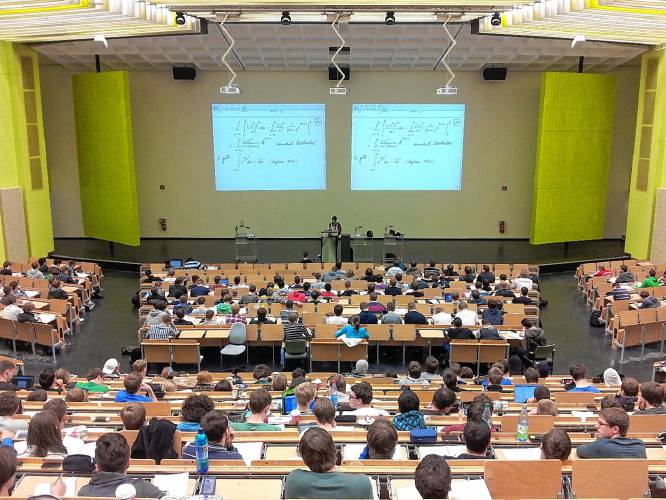Opinion: A question of education

Pixabay Pixabay
| Published: 02-05-2024 6:00 AM |
John Buttrick writes from his Vermont Folk Rocker in his Concord home, Minds Crossing. He can be reached at johndbuttrick@gmail.com
Donald Trump beat Nikki Haley by 11 percentage points in New Hampshire’s Republican primary. According to exit polls, the only group of voters who did not demonstrate a majority for Trump was college graduates. This observation contributes to political pundits’ search for answers to why there is growing antipathy toward higher education.
The reasons for white working-class alienation have shifted from decade to decade including issues such as race, religion, war, environmentalism, guns, trade, immigration, sexuality, crime, and social welfare programs.
One cause may be suggested in “The Art of the Deal,” where Trump wrote, “In my opinion, that degree doesn’t prove very much, but a lot of people I do business with take it very seriously. So, all things considered, I’m glad I went to Wharton.”
This observation may communicate an exclusiveness among college graduates, that they are only interested in relationships and actions that enhance their own wealth, power, and prestige. It is ironic that Trump’s view espouses these conflicting points of view: a degree is of little value and a degree includes a person in a club of people that can have their own way in economics, politics, and social ethics.
How times have changed! “The education of the common people,” Thomas Jefferson wrote, “on their good sense we may rely with the most security for the preservation of a due degree of liberty.” Albert Einstein wrote, “the value of a college education is … training of the mind to think.”
Trump seems to be saying, college is useless for the average working-class person, but it gives power to special people over the working class and the average citizen. This point of view is supported by economists Anne Case and Angus Deaton who write, “graduating from college has become especially important. This single social marker now determines, much more than it did in the past, what sort of economic opportunities you are likely to have.” A college degree often gives an arbitrary social status, “so that jobs are allocated, not by matching necessary or useful skills, but by the use of the BA as screen.”
The apparent social status of a college degree, the arbitrary criterium for using it in the hiring process, its appearance of exclusiveness, and the idea that a college degree may be “useless,” these things would seem to create distrust, powerlessness, meaninglessness, and fearfulness by people looking in from the outside of the college club.
Article continues after...
Yesterday's Most Read Articles
 After four decades collecting carts, Ricky Tewksbury will retire when Shaw’s closes mid-April
After four decades collecting carts, Ricky Tewksbury will retire when Shaw’s closes mid-April
 Written shooting threat sends Concord High students home early
Written shooting threat sends Concord High students home early
 Amy Doyle returns to Hopkinton School District to become next superintendent
Amy Doyle returns to Hopkinton School District to become next superintendent
 Concord Coach to resume daily bus service to New York City
Concord Coach to resume daily bus service to New York City
 Loudon school board member resigns; Merrimack Valley board accepting applications to fill seat
Loudon school board member resigns; Merrimack Valley board accepting applications to fill seat
Colleges and universities are not perfect, nor are the graduates. There is stress over financial accessibility and there will always be a debate about the purpose of college. Graduates sometimes use their knowledge in harmful ways. However, Yascha Mounk recently wrote in The Atlantic, “According to one theory, Americans who go to college acquire skills that allow them to excel in a range of professions … contribute to public life and our collective prosperity.”
It is recorded that Confucius said, “To study and not think is a waste. To think and not study is dangerous.” Let education be our guide in preparation for the upcoming presidential election.
Confucius also said, “Education breeds confidence, confidence breeds hope, hope breeds peace.”







 Opinion: Courage and care count
Opinion: Courage and care count
